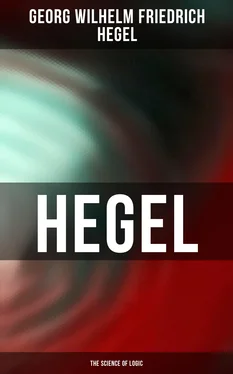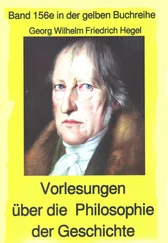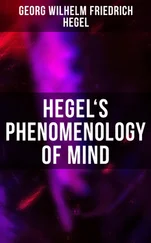Georg Wilhelm Friedrich Hegel
Hegel: The Science of Logic

Books
OK Publishing, 2020
musaicumbooks@okpublishing.infoTous droits réservés.
EAN 4064066395865
Chapter I. Introduction
Chapter II. Preliminary Notion
Chapter III. First Attitude of Thought to Objectivity
Chapter IV. Second Attitude of Thought to Objectivity
Chapter V. Third Attitude of Thought to Objectivity
Chapter VI. Logic Further Defined and Divided
Chapter VII. First Sub-Division of Logic
Chapter VIII. Second Sub-Division of Logic
Chapter IX. Third Sub-Division of Logic. The Doctrine of the Notion
Table of Contents
1.] Philosophy misses an advantage enjoyed by the other sciences. It cannot like them rest the existence of its objects on the natural admissions of consciousness, nor can it assume that its method of cognition, either for starting or for continuing, is one already accepted. The objects of philosophy, it is true, are upon the whole the same as those of religion. In both the object is Truth, in that supreme sense in which God and God only is the Truth. Both in like manner go on to treat of the finite worlds of Nature and the human Mind, with their relation to each other and to their truth in God. Some acquaintance with its objects, therefore, philosophy may and even must presume, that and a certain interest in them to boot, were it for no other reason than this: that in point of time the mind makes general images of objects, long before it makes notions of them, and that it is only through these mental images, and by recourse to them, that the thinking mind rises to know and comprehend thinkingly.
But with the rise of this thinking study of things, it soon becomes evident that thought will be satisfied with nothing short of showing the necessity of its facts, of demonstrating the existence of its objects, as well as their nature and qualities. Our original acquaintance with them is thus discovered to be inadequate. We can assume nothing, and assert nothing dogmatically; nor can we accept the assertions and assumptions of others. And yet we must make a beginning: and a beginning, as primary and underived, makes an assumption, or rather is an assumption. It seems as if it were impossible to make a beginning at all.
2.] This thinking study of things may serve, in a general way, as a description of philosophy. But the description is too wide. If it be correct to say, that thought makes the distinction between man and the lower animals, then everything human is human, for the sole and simple reason that it is due to the operation of thought. Philosophy, on the other hand, is a peculiar mode of thinking—a mode in which thinking becomes knowledge, and knowledge through notions. However great therefore may be the identity and essential unity of the two modes of thought, the philosophic mode gets to be different from the more general thought which acts in all that is human, in all that gives humanity its distinctive character. And this difference connects itself with the fact that the strictly human and thought-induced phenomena of consciousness do not originally appear in the form of a thought, but as a feeling, a perception, or mental image—all of which aspects must be distinguished from the form of thought proper.
According to an old preconceived idea, which has passed into a trivial proposition, it is thought which marks the man off from the animals. Yet trivial as this old belief may seem, it must, strangely enough, be recalled to mind in presence of certain preconceived ideas of the present day. These ideas would put feeling and thought so far apart as to make them opposites, and would represent them as so antagonistic, that feeling, particularly religious feeling, is supposed to be contaminated, perverted, and even annihilated by thought. They also emphatically hold that religion and piety grow out of, and rest upon something else, and not on thought. But those who make this separation forget meanwhile that only man has the capacity for religion, and that animals no more have religion than they have law and morality.
Those who insist on this separation of religion from thinking usually have before their minds the sort of thought that may be styled after-thought. They mean 'reflective' thinking, which has to deal with thoughts as thoughts, and brings them into consciousness. Slackness to perceive and keep in view this distinction which philosophy definitely draws in respect of thinking is the source of the crudest objections and reproaches against philosophy. Man,—and that just because it is his nature to think,—is the only being that possesses law, religion, and morality. In these spheres of human life, therefore, thinking, under the guise of feeling, faith, or generalised image, has not been inactive: its action and its productions are there present and therein contained. But it is one thing to have such feelings and generalised images that have been moulded and permeated by thought, and another thing to have thoughts about them. The thoughts, to which after-thought upon those modes of consciousness gives rise, are what is comprised under reflection, general reasoning, and the like, as well as under philosophy itself.
The neglect of this distinction between thought in general and the reflective thought of philosophy has also led to another and more frequent misunderstanding. Reflection of this kind has been often maintained to be the condition, or even the only way, of attaining a consciousness and certitude of the Eternal and True. The (now somewhat antiquated) metaphysical proofs of God's existence, for example, have been treated, as if a knowledge of them and a conviction of their truth were the only and essential means of producing a belief and conviction that there is a God. Such a doctrine would find its parallel, if we said that eating was impossible before we had acquired a knowledge of the chemical, botanical, and zoological characters of our food; and that we must delay digestion till we had finished the study of anatomy and physiology. Were it so, these sciences in their field, like philosophy in its, would gain greatly in point of utility; in fact, their utility would rise to the height of absolute and universal indispensableness. Or rather, instead of being indispensable, they would not exist at all.
3.] The Content, of whatever kind it be, with which our consciousness is taken up, is what constitutes the qualitative character of our feelings, perceptions, fancies, and ideas; of our aims and duties; and of our thoughts and notions. From this point of view, feeling, perception, &c. are the forms assumed by these contents. The contents remain one and the same, whether they are felt, seen, represented, or willed, and whether they are merely felt, or felt with an admixture of thoughts, or merely and simply thought. In any one of these forms, or in the admixture of several, the contents confront consciousness, or are its object. But when they are thus objects of consciousness, the modes of the several forms ally themselves with the contents; and each form of them appears in consequence to give rise to a special object. Thus what is the same at bottom, may look like a different sort of fact.
The several modes of feeling, perception, desire, and will, so far as we are aware of them, are in general called ideas (mental representations): and it may be roughly said, that philosophy puts thoughts, categories, or, in more precise language, adequate notions, in the place of the generalised images we ordinarily call ideas. Mental impressions such as these may be regarded as the metaphors of thoughts and notions. But to have these figurate conceptions does not imply that we appreciate their intellectual significance, the thoughts and rational notions to which they correspond. Conversely, it is one thing to have thoughts and intelligent notions, and another to know what impressions, perceptions, and feelings correspond to them.
Читать дальше













